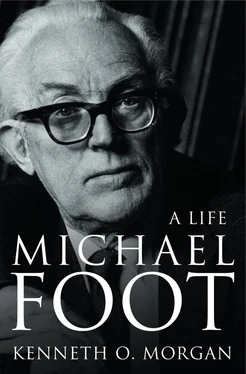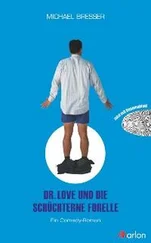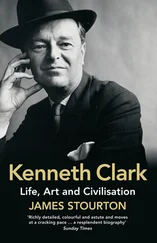The names of Crossman and Foot were attached to a particularly effective thirty-two-page pamphlet for Gollancz in the autumn of 1946, A Palestine Munich? . In fact much of it, including the entire first section, was written by Arthur Koestler. 19 It detailed the restrictive immigration policy up to 1939 and the rise of Jewish and Arab resistance. The 1939 White Paper, calling for a future Arab Federation in Palestine with highly restricted Jewish immigration, was dismissed as a bribe to the Arabs to prevent their sympathizing with Germany. The pamphlet called for the government to allow full immigration of Jews up to the limit of Palestine’s capacity to absorb them, and not to use force of arms to endorse what Labour ministers themselves had called a Palestine Munich. A promise of early independence to the Palestinian Arabs would mean ‘an Anglo – Jewish war’. The booklet’s political solution, in the absence of one being suggested from the Foreign Office, was a partitioned Palestine free of American military involvement, consisting of a ‘Judean state’ based on large-scale immigration, and an Arab state, with the central mountain region transferred to the Kingdom of Transjordan. At this point Britain would withdraw its forces, and self-interest would compel both the new Jewish and Arab states to collaborate and to come to terms with each other. It was the most cogent statement by pro-Jewish Labour representatives yet written, and it was predictably dismissed out of hand by all Arab representatives. Basically, it reflected Koestler’s totally one-sided Jewish sympathies (he wrote in support of the Stern Gang’s operations), and got nowhere. As it happened, Koestler greatly disliked Israel when he moved there, quarrelled with Prime Minister David Ben-Gurion and old friends like Teddy Kollek, and rapidly returned to Britain amidst acrimony all round. 20
Through Tribune , and to a far lesser extent through his Daily Herald column (which usually was safely loyalist), Foot kept up his campaign on behalf of the Jews in 1947–48. The British government, in which the Colonial Secretary Arthur Creech-Jones was given the poisoned chalice of Palestine, offered no way forward. Creech-Jones’s partition proposals collapsed; Bevin’s proposal for five more years of British trusteeship offered nothing new; the United Nations came out with a scheme for immediate partition which Bevin promptly rejected. In the end the British government, harassed by the huge support costs of maintaining troops in Palestine, decided simply to pull its forces out, and withdrew them by 15 May 1948. Attlee quoted the precedent of the withdrawal from India. But there the British government had produced an agreed scheme for a political settlement that would follow. In Palestine there was none. The Foreign Office imagined that the various Arab armies would simply drive the Jews into the sea. The successful creation of the state of Israel in 1949 astonished everybody. Foot, of course, was delighted that a Jewish state had come into being against the odds. In an adjournment debate on 12 August 1947 he had called for the early withdrawal of British forces. The British people themselves were delighted to see their troops withdrawn from a violent land, but it was impossible to see the Palestine settlement as anything other than a shambles and a catastrophe. Foot might hope that the Jewish people would enter a more settled phase after August 1948. In fact, their tragedy was to haunt him and the world for the remainder of his life.
His main concern in Tribune columns and Commons speeches, though, was the deepening crisis in relations with Russia. Throughout 1946, especially in Germany, the eastern Mediterranean and the Middle East, the atmosphere seemed ever darker. Of all the commentators on the left, Michael Foot was one of the most outspoken in denouncing Russian policy in eastern Europe after the war. In the press he condemned Russia’s intimidation of the socialists in Poland, its pressure upon Yugoslavia, its totalitarian control of eastern Germany. 21 Beyond Europe, his visit to Iran had convinced him of Russian dreams of domination in the Middle East as well. On the other hand, he shared the anxiety common on the left at the drift towards a full-scale military alliance with the United States. Churchill’s ‘iron curtain’ speech at Fulton, Missouri, in March terrified him. Dissatisfaction with Bevin’s policy built up amongst Labour MPs in 1946, and finally spilled over, with a critical letter sent to Attlee on 29 October by a group of twenty-one Labour backbenchers urging that a democratic socialist Britain ought to pursue a genuine ‘middle way’ between American ‘free enterprise’ and Russian totalitarianism. They were far from being a far-left caucus; they included Crossman, Foot, Levy and Silverman, but also Callaghan and Woodrow Wyatt. A few days later Crossman circulated an amendment to the Address which urged ‘full Socialist planning and control’ of the world’s resources, and ‘a democratic and constructive Socialist alternative to the otherwise inevitable conflict between American capitalism and Soviet Communism’. In the end, forty-three Labour MPs put their names to it; among them, in addition to Crossman, were Levy, Silverman and Michael Foot. The name of Jennie Lee, Bevan’s wife, indicated that at least one Cabinet minister was unhappy too. 22
Crossman moved his amendment on 18 November 1946, though he lessened its impact from the start by saying he would not call a division. 23 In sharp terms, he asked the government to reject proposals for an Anglo – American military alliance, and asked whether precise arrangements in terms of arms sharing and staff discussions were already under way. Since Bevin was away in New York, Attlee himself replied, mildly criticizing Crossman’s speech as totally one-sided. Two Scottish ILP members mischievously moved Crossman’s amendment to a vote, and the government won by 353 to 0, with several Labour abstentions, including Foot. But left-wing anxiety about British foreign policy moved onto a new stage two months later when the ‘Truman doctrine’ for US military aid to potential victims of Soviet aggression resulted in new American military involvement in Greece and Turkey. Talks at the Council of Foreign Ministers in New York had effectively broken down. Talk of a Cold War, an iron curtain and even a possible third world war became commonplace.
Michael Foot had taken little part in the Crossman amendment debate, and indeed had been under fire himself from the left for being too anti-Soviet in Tribune . He remained so in the Daily Herald , and satirized Molotov’s plans for ‘European confusion’. 24 But he also now became a leader of the most significant protest against government policy since the general election. Some left-wing MPs now began to meet regularly to prepare plans: led by Crossman, Foot and Mikardo, they also included Stephen Swingler, Harold Davies, Mallalieu, Benn Levy, Kim Mackay and Woodrow Wyatt. They met against a background of a serious fuel crisis in the severe winter of early 1947, and amidst fears that Labour’s socialist advance was slowing down. The economic crisis of the summer of 1947 was another major factor. The outcome was Keep Left , a pamphlet which appeared in May 1947, in time for the party conference at Margate. 25 It was the product of a draft ‘red paper’ worked out with Foot and Mikardo at Richard Crossman’s home at Radnage in Buckinghamshire. It included calls for more socialist planning in domestic policies, but what caught the imagination were the criticisms of foreign and defence policy, its call for Britain to stand aloof from confrontations between America and Russia, to withdraw its troops worldwide, and to demobilize rather than embark on conscription. Some of this was the work of Crossman, especially a chapter on ‘The Job Abroad’ and passages on international affairs more generally. But another key author was Michael Foot, whose contribution focused on the domestic economic scene, notably ‘socialist planning’ and tighter controls on capital and labour. With his other outlets in the press, he was typecast as a symbol of Keep Left from then on.
Читать дальше












